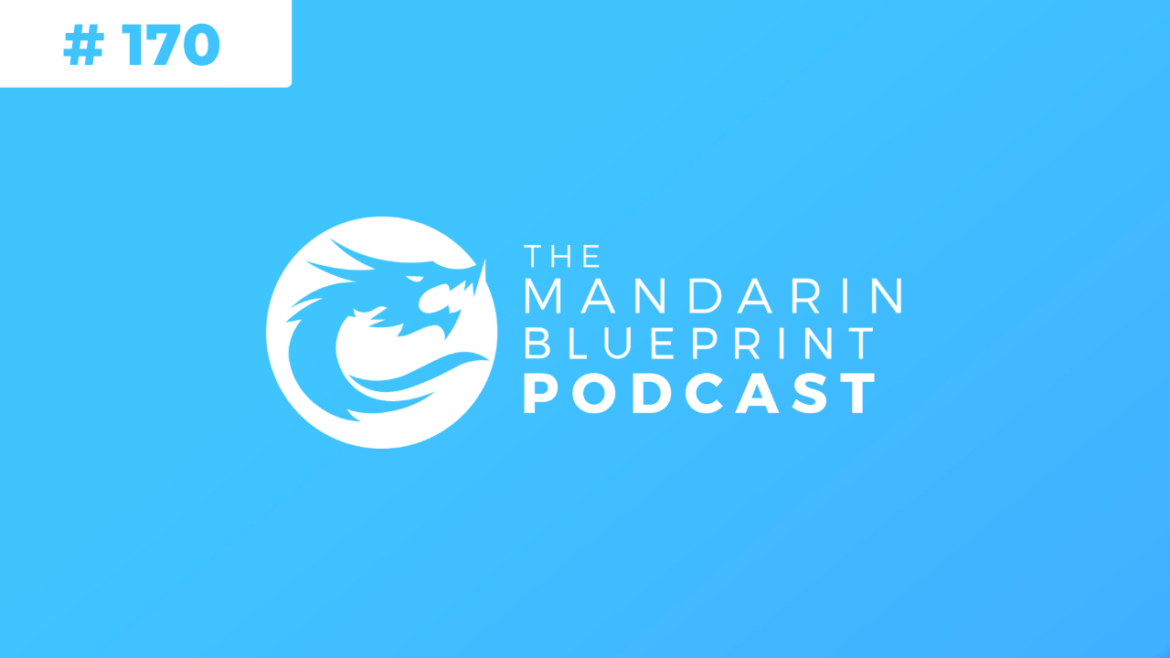
170. Inspiring Progress Reports From MB Members
欢迎光临! Welcome!
You can now subscribe to the podcast by the links below, or you can subscribe by copying the following URL into your favorite podcast APP.
The Mandarin Blueprint Podcast focuses primarily on The Blueprint online curriculum. Creators Luke Neale & Phil Crimmins answer questions and comments, discuss topics related to China and Mandarin learning, and have special guests.
Want to learn how to speak fluent Chinese fast? Join our free Webinar right here.
欢迎光临! Welcome!
You can now subscribe to the podcast on iTunes, Stitcher, Spotify, or you can subscribe by copying the following URL into your favorite podcast APP:
https://www.mandarinblueprint.com/feed/podcast/
The Mandarin Blueprint Podcast focuses primarily on The Mandarin Blueprint Method online curriculum. Creators Luke Neale & Phil Crimmins answer questions and comments, discuss topics related to China and Mandarin learning, and have special guests.
0:00 Affiliate Link & Reviews
Become a Mandarin Blueprint Affiliate
Leave us a Google Business Review 🙂
1:40 Comments & Emails
Email from Anonymous
Hey Luke and Phil. Almost done with level 55!!!!! No one else gets this except those in the course…I’ve added and reviewed all the sentence cards so far in the intermediate course! It’s been hard work and slow progress at times and I know not recommended….BUT… yesterday speaking to my friend who has been learning Chinese and spent time speaking to native speakers a lot and he is asking me what certain words are and they’re just there! I know what the character looks like in my mind, I have a deeper understanding of the usages of it as I’ve seen it in multiple compound words and if I’m ever in doubt on the tones they can be found in my mind almost instantly. Only three weeks away from finishing this phase and I’m very excited. So thanks so much for the brilliant course. I can’t afford a teacher yet but plan to once I’ve finished the upper intermediate course to start using all this stuff stored in my memory palace. I find myself saying things in Chinese all day long and it’s amazing how lots of 的’s and 了’s find their way into sentences without thought. Will probably send an hugely unnecessarily long email once I’m done with the intermediate course, lol.
7:45
Email from Gavia
Hi Luke & Phil,
It´s Gavia again! Today is Sunday, finally time for Chinese and to fill your inbox with too long messages!
I got up, went for a walk and started to review some sentences and actively listen to one of those too difficult podcasts that I don´t have time for during the week, then kept on with passive listening when making breakfast etc. Don´t know how long but maybe close to three hours of uninterrupted listening at different levels of paying attention to it or not.
Then I talked on the phone with my “spy guy” HelloTalk friend. I haven´t spoken more than a few times with anyone in the past three months or so, and the conversations are always a very “organic” mixture of Chinese and English or Spanish, more for the sake of communication than formally learning or teaching.
Today it worked out well though, he was telling me about a project he has in mind and I corrected just a few words here and there, his English is very good. Then I suggested he should tell me the same story in slow and easy Chinese. While he was speaking Chinese I would repeat some sentences back to him in Chinese and he´d correct my pronunciation. Or I would repeat the idea of a longer sentence back to him in English to let him know how much I understood even when I didn´t understand every word of it. This was actually much more useful language learning-wise than my usual HT conversations mixing languages.
At one point he said a sentence that ended in something that sounded like “lihe” and said he didn´t actually know how to translate the last word to English and I shouldn´t worry about it. I said to him in English what I had understood of the sentence, and then asked him: 难道你说的是礼物的”礼”,盒子的”盒”,对不对? And it WAS! He actually was talking about a giftbox.
It´s not that hard, 礼物 is a word that I know from before, I have not formally studied 盒子 but I think it´s there as a top down word in MB sentences, and I totally knew the context from having heard his story in English a few minutes ago. Seeing it in writing it would have been obvious anyway. But still, this is a first for me: grabbing a new word directly from SPOKEN language, not seeing the characters but just listening and noticing “hey, this must be it”, immediately knowing how it´s written and all!
It felt incredible – and “spy guy” was again convinced that I must be a spy that actually has a much higher Chinese level that anyone thinks. 🙂 I must say that this wouldn´t have happened if it wasn´t for throughly knowing the characters that I know from studying your course (level 48 for me right now) and for your advice to listen, listen, listen and immerse in the language. But I have been doing my listening immersion for what, maybe less than three weeks now!? It really WORKS!
We kept on speaking for a while and then another HT friend showed up chatting in writing and now I still have all the afternoon to myself and Chinese. I´m happy and excited and want to keep studying or at least listening – but I´m wondering about what’s the best course of action when I have been doing things that are really on the limit of my abilities for the whole morning and my brain is FRIED. Happily fried, but absolutely fried. Should I just keep on listening to some easier stuff or study characters or maybe it would be better to just let things rest and go for total silence until tomorrow, just being happy about today’s wins? I guess there´s no “right” answer to that.
Can´t help thinking about how the learning process will be at the point where I will actually be able to pick up words from speech “on the go” like this…. mind-blowing!
Thank you, thank you, thank you and best regards,
Gavia
14:42
Email from Gavia
Hi Luke & Phil,
I´m so excited about my new “immersion phase” and I have tons of ideas and questions. But today I really try to keep this short or SHORTER than usual at least!
Do you think it’s OK to listen to people speaking with an accent when starting the immersion phase
Someone Chinese (NOT a language learning specialist in any way) mentioned that I should stick to listening to standard Mandarin only to avoid learning bad pronunciation.
My own thinking is that standard Mandarin is important at the time when I start to speak or when I´m shadowing. I consider listening to audio with different accents as good way to practise getting used to hearing the same things pronounced a bit differently (it´s still putonghua, not any other “dialect”). I do try to make sure I get a “varied diet” of audio that includes lots of “healthy” standard pronunciation as well, the MB course material is FULL of that and I listen to it every day.
I was going to say that when I listen to accented speech I like to try to pay attention to HOW they are pronouncing things differently, but that´s more wishful thinking rather than the truth. When I listen to native speed speech with an accent (or without an accent….) I don´t understand much of it and I definitely don´t have time to THINK of anything AT ALL!
However, I sometimes find that just relaxing into listening to that level of speed, not worrying whether I understand or not, sometimes helps me to “lift” my mind to a state where I surprisingly understand much more than I ever thought I could. Kind of like I understand faster than I can think, which could also be expressed as “I stopped trying to unconsciously translate what I´m hearing even if I never noticed that I was translating in the first place.” Sometimes it’s so weird that as soon as I notice that I understand actually quite a bit I immediately “fall” back to reality, start thinking and quit understanding. A bit like when you are dreaming and you notice that it´s a dream but as soon as you notice you wake up and can´t get back.
This is why I want to include some “too difficult” material in my listening diet, besides the fact that “real life” (when my Chinese eventually gets there some day) will be like that, accents vary and everything is too fast. I think trying to listen to the “real thing” is just fun and cool! Getting to that “not thinking but understanding” state doesn´t happen to me with slow and understandable audio. It needs to be something so fast and hard that I can (maybe) give up trying and thinking. But yes, there needs to be a daily dose of understandable, easy standard audio too.
Thank you again and congratulations for getting the Advanced Course out! I look forward to getting there!
Gavia
22:27
JOHN CRAMER on Time to Get Real About Sentences
This lesson didn’t come soon enough! What a great boost to put all the Hanzi movie-making to practical use! And, what a thrill to be able to read sentences in Mandarin! Love it!
23:03
Lynn Ford on Vocab Unlocked from 斯
I was wondering if you knew like the origins of 歇斯底里? Usually I can kinda figure out why certain characters are used for a word, but this one I am at a loss. I tried a google search and couldn’t find anything. I went over each character in Pleco, to see if I could figure out there and I just don’t understand why these characters were chosen to mean hysterical. Just curious if you knew, thanks.
25:37
Jimmy on Vocab Unlocked from 血
Hey guys. Is there a rule for when it would be xuè and when if would be xiě?
读xuè
血红蛋白(限定)、血肉模糊(并列。松散化、口语化:血xiě和肉都混一起,看不清)、血液循环(限定)、一片血泊(修饰)、腥风血雨(修饰)、血浓于水(文雅、滞古。口语化:血xiě比水浓)、血流成河(文雅、滞古。口语化:xiě流得都像河一样了)
读xiě
鸭血(口语词)、流鼻血(口语词)、抽血(结构松散、偏口语。书面化:抽取血xuè液)、一针见血(结构松散、俗语词)、产后大出血(结构松散、新造白话)
32:22
Lynn Ford on Vocab Unlocked from 迫
睡觉的时候不要用手压迫胸,会做噩梦。
This was interesting sentence. I had never heard of this before and wanted to know if this was actually a thing. So I paused my flashcard reviews and dived into a rabbit hole of articles about where this came from and there is some science behind it. Which lead to reading about pressure points on the body and then some folk stories. All very fascinating. It happens a lot when I read something on our cards or stories and then end up in a google black hole of learning more about the culture. I love how language learning is about so much more than just speaking 🙂
37:28
Matt Shubert on Level 33 Complete
Oh my gosh, the explanations for the question words are SO helpful. I get why they weren’t an explicit grammar point earlier in the course, because that would be distracting & counter-productive for the reasons you mention in this same article, but it feels like a missing puzzle piece for me to see what I’ve been (unconsciously) getting the hang of spelled out explicitly like this.
There is really *so* much clicking in the home stretch of the foundation course, I’m excited for the last few levels!!
39:19
Rick Angleland on 要求 in Context
Any suggestions for our mnemonic movie to remind us of the less-common tone for 要 in 要求?
40:24
JOHN CRAMER on 几(个) in Context
I just wanted to say I have learned a lot so far from the member comments and the videos. Really appreciate everyone’s contributions and the responses/follow-up clarifications from Luke and Phil.
41:13
Rick Angleland on 所以 in Context
re 花儿们
I thought 们 was only used for people? or if not, what class of things?
42:37
Teodor Ruokolainen on MAKE A MOVIE 谢
This is really cool! This is the sort of character I would have looked at before starting the course and thinking “how could you possibly remember all the strokes in that?!”. But here I am, able to easily write it out since I have learned each component step by step. Really looking forward to learn even more “complicated” characters in the future!


